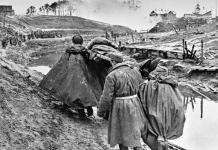The main indicator of our work activity is our performance, those. a certain level of functional capabilities of the body, which characterizes the effectiveness of the work performed by us for a certain period of time.
Since our performance depends on many factors, such as: gender, age, physical and mental state, mood, diet, knowledge, skills, skills and experience, in essence, we are able to manage many of the above. In general, you can learn how to manage your performance.
And although performance is a variable value, which also depends on the influence of weather conditions, seasons and moods, scientists and researchers have found that if we better know the characteristics of our body and the conditions in which it works most efficiently, then we will be able to manage our performance. at various periods of time.
Stages of our performance
For what, you ask? Everything is very simple: knowing the time of the next period of fatigue, we will be able to calculate and prepare everything in advance so that the work as a whole is completed within a certain period. It is useful to know interesting facts about several stages that characterize performance:
First stage: Working in - falls on the first, and less often on the second hour of work.
Second stage: Sustainable performance - lasts the next 2-3 hours of work.
Stage Three: Fatigue when performance declines.
For the whole working day, these stages are repeated twice - before the lunch break and after it. The same thing can be observed during the working week: on Monday you sometimes have to work through the force, Tuesday-Wednesday-Thursday are marked by stable effective activity, and on Friday-Saturday we are in for a period of fatigue (braking), on Sunday half of the day is spent preparing for the first stage. I hope that this is well known to those who work from Monday to Friday-Saturday.
It is important not to skip the stage of sustainable performance and learn how to make the best use of the time that falls under this period.
There is a famous saying:
"Who gets up early, God gives it to him."
I confess, being by nature not exactly a lark, I have never understood the meaning of this proverb before. However, life with an enviable constancy gives its lessons, and we have to admit that using the early morning time can be very useful. Thus, switching to the language of scientists, we shorten the period of development, and quickly bring our body into working condition.
Taking into account all the factors affecting human performance, British scientists have determined the phases of the day for the average type of person and their main differences.
Interesting facts about human performance
The 6:00 to 7:00 window is when long-term memory works best. It is easy to assimilate all the information received during this time period.
From 8:00 to 9:00 is the most suitable time for any activity related to both memorization and analytics. It's all about the active work of logical thinking.
From 9:00 to 10:00 are the optimal hours for working with information and statistics.
From 11:00 to 12:00 - at this time, the effectiveness of intellectual functions decreases. So, you can switch attention to something abstract. For example, listen to music.
From 11:00 to 14:00 is the best time for lunch. During these hours, there is a peak, as they say in the East, "the fire of digestion", when the food taken is digested and absorbed in the best way.
From 12:00 to 18:00 is the ideal time for active work. Labor in the later hours forces the brain to work for wear and tear. The first signs of such an overstrain are difficulty falling asleep.
From 21:00 to 23:00 - the most complete rest of the mind and nervous system takes place.
From 23:00 to 1:00 - in a dream, there is an active restoration of subtle energy. In Chinese medicine it is called “chi”, Indian yogis call it “prana”, modern science calls it nervous and muscular strength.
From 1:00 to 3:00 - in a dream, a person restores emotional energy.
From 3:00 to 6:00 - sleep, sleep and sleep again! Beneficial to health, mood and performance.
I propose to take a ride on the hills of working capacity on your own and adjust the daily phases in relation to your own person.
How much can you work? As much as you need, but don't commit suicide. A worn out and overly loaded body can fail at any time. It's important to know about this. Everyone knows the moments when overwork accumulates and loss of performance is inevitable. In this case, only a BREAK can help, and sometimes a very long one.
Drowsiness, lethargy, numbness of the muscles of the back or neck, headache, decreased concentration and memory impairment, deep exhaustion of strength - all this and much more signals a persistent unwillingness to even go to your favorite job and work at full strength. These are clear signs of overwork, and fighting it is like fighting weeds.
How to restore your performance?
And yet, there are many recipes for restoring sustainable performance. In any case, for sure, you use them:
- micro breaks
- Short stops
- Physical exercise
- Sipping
- Face and neck massage
- Drink a mug of sweet tea
- eat chocolate
- Wash with cold water
- Change the type of activity, situation
- Go to bed early and sleep well
- On weekends, active recreation is preferable to active: swimming, skiing, running, sports games
- Take a vacation and fly to the sea
- Visit another country or another city to change impressions
- Have a good time with friends
- Reduce load, take time out
On the other hand, knowing about the features that affect our own activities, and about the recommendations that can be used to prevent overwork, we will be able to manage our own performance, learn to multitask and increase the efficiency of our activities.
the potential ability of an individual to perform an expedient activity at a given level of efficiency for a certain time.
Great Definition
Incomplete definition ↓
PERFORMANCE
the potential ability of a person to perform k.-l. operating at a sufficiently high level of efficiency for a continued period of time. Depending on the predominance in the work of physical. or mental efforts distinguish R. mental and physical. This distinction is arbitrary: R.'s specificity depends on the proportion of one or another factor in activity.
Long-term work is inevitably accompanied by R.'s fluctuations due to the action of many others. factors. The most important of these is fatigue. However, there is no direct relationship between R. and fatigue; there may be cases of maintaining a high level of R. despite the effect of the fatigue factor, and vice versa - a decrease in R. with mild fatigue. Changes in R.'s condition depend on external. conditions of activity (its volume, intensity, complexity, duration, continuity). and from psychol. and psychophysiol. characteristics of a particular person (motivation, perseverance, attitude to the work performed, interest in it), from individual characteristics of temperament, character, type of nervous system, etc.
R.'s level change is described by means of so-called. curve P., showing the dependence of the effectiveness of the activity on the time of its implementation. With all the variety of factors on which R. depends, certain general characteristics of its dynamics can be distinguished, in particular the daily fluctuations of R. As a rule, naib. favorable for a high level of R. morning hours when they are preceded by normal sleep. At the same time, Naib. a high level of R. does not come from the very beginning of work, but somewhat later, when the period of “working in” ends, there is a concentration of attention and effort, and release from distracting influences. The further course of R. is characterized by a relatively stable level (“plateau” of the R. curve), which changes in an adult after 3-4 hours (in a schoolchild after a shorter period of time). does not mean. a recession due to the need for rest and food (usually a lunch break at work is timed to this time, a big break at school). The subsequent course of the R. curve, as it were, repeats the trend of the beginning. morning phase, but on a general somewhat reduced cf. level. R.'s decrease by the end of the working day is a very typical phenomenon. However, just before the end of the work, there is often a certain rise in R. (“impulse”), caused by the consciousness of the near end of the work and the corresponding feeling of satisfaction.
In the process of work, little noticeable fluctuations in the working tone occur, the more pronounced, the more intense the work. These fluctuations are compensated by finding the optimal rhythm and micro-pauses, since long-term efforts cannot be continuous. Main a symptom of weakening efforts is a change in the intensity of attention, expressed in distractibility, a decrease in interest, an increase in the number of mistakes made, etc., which signals the need for breaks in work. Monotonous work requires more frequent breaks, as does work associated with increased attentional stress.
In accordance with the age characteristics and capabilities of students in the account. institutions set a certain duration of classes, introduced breaks of different duration. Naib. difficult lessons are recommended to be carried out in the first hours of classes, when the R. of students is optimal. Uch. the year is divided into certain segments, between which vacations are established. Approximate recommendations for maintenance of the necessary level of R. are developed at independent. work of students (see School mode, Day mode).
Today we will talk about human performance. I will tell you about what working capacity is, what it depends on, what are the main factors of human performance, and I will also dwell on what time a person is most efficient, based on his biological characteristics. I think it will be useful to know for your work.
What is performance?
Let's start with a definition. If we turn to dictionaries, we will read something like the following.
The working capacity of a person is his ability to perform certain work with given quality parameters in a set period of time. Despite the apparent simplicity, this concept is quite complex, and here's why. On the one hand, working capacity is an indicator of certain biological functions of a person, and on the other hand, it is an indicator of his mental abilities, professionalism in a particular business, the presence of certain knowledge, skills and business qualities.
factors of human performance.
Let's highlight the main factors that affect human performance.
- Physical and physiological features. The better a person is developed physically, the higher his working capacity. Also, the features of his physiology play a role, which may interfere with the performance of certain work, the current state of health of a person as a whole or of his individual organs.
- Psychological features. In particular, stress resistance, purposefulness, level of motivation, etc., up to mood. The more developed all these qualities, the higher the working capacity of a person, and vice versa.
- The level of mental and intellectual development. The development of creative and logical thinking, resourcefulness. The working capacity of a person largely depends on how intellectually developed he is. Moreover, even if he does physical work: a smart person can find a way to do it faster and with less effort.
- Working environment. For example, the equipment of the workplace, the availability of all necessary accessories for work and their quality, the lighting of the workplace, the air temperature, the noise level, etc. All these are also factors of human performance.
- Knowledge, skills, abilities. The level of professionalism in the work that a person performs, of course, also has an impact on his performance.
- Self-discipline and self-organization. An important factor in a person's performance is his ability to organize himself and his work process.
- Fatigue. And, finally, it must be recognized that a person's performance decreases in proportion to his fatigue, fatigue. The more a person gets tired, performing this or that work, the lower his performance decreases.
The time of maximum human performance.
Now let's talk about the time of the highest human performance. It is determined by the physiological functions of the body, which are inherent in it by nature. As you know, according to the characteristic biological lifestyle, people are divided into 2 types: “owls” and “larks”, and the time of maximum performance for these types of people will also be different.
For “larks”, the hours of the highest working capacity coincide with the first half of the traditional working day - from 9 to 14 hours, then their working capacity gradually decreases, and by 17-18 hours it becomes as low as possible. The “owls” are different: the time of their highest performance shifts significantly in proportion to the hours of shift of their sleep in comparison with the “larks”. The most notorious “owls” have the highest working time - from 18 to 24 hours. But, I draw your attention, the night hours from 0 to 5 am are not workable for anyone.
Next, I want to bring to your attention a few more interesting observations obtained by scientists who studied human performance (they are relevant for people leading a traditional lifestyle: sleep at night, stay awake during the day).
- From 6 to 7 in the morning, a person has an “hour of long-term memory” - at this time he is able to remember the information received for the longest period of time;
- From 8 to 9 o'clock in the morning, a person's logical thinking functions as much as possible, so this hour is best used for carrying out some kind of analytical actions, active thinking, drawing up plans;
- From 9 a.m. to 12 a.m. is the optimal time for engaging in active mental work; during these hours, a person’s performance in intellectual work is the highest.
- From 14 to 18 hours - on the contrary, the ideal time for physical labor, in which you do not need to think much. Of course, if you do not do this work in the morning, and are not tired by this time. It is better to plan hard physical labor for the afternoon.
Stages of human performance.
As you can see, during the working day, a person's performance is not the same. Therefore, we can distinguish several stages of performance that any person goes through during his working day:
- Entering the workflow. This period lasts the first half an hour or an hour from the start of work, less often - 2 hours. This time is necessary for a person to “activate” his working capacity and prepare for its maximum stage.
- Maximum performance (1 stage). For the next 2-3 hours, a person's working capacity is maximum, and at this time he is able to effectively perform the most complex work.
- Decreased performance (stage 1). Further, the working capacity will begin to decline, and will fall to zero or until the moment when the person has a rest from work. Such a rest is usually a lunch break.
- Lunch break. To normalize performance, a person needs to eat and rest for at least an hour.
- Maximum performance (stage 2). After a break, a person returns to work with renewed vigor, and can again work quite efficiently, however, his performance here will be slightly lower than at the first, morning stage, and this stage will also be shorter in time (1-2 hours).
- Decreased performance (stage 2). Further, after about 1-2 hours, the human performance will again begin to fall.
- Exit workflow. The last half an hour or an hour of working time, a person’s performance will be minimal, since he will psychologically already be waiting for the end of the working day, and fatigue by this time will be maximum.
Human performance during the week.
It should also be noted that during the working week, a person’s performance is also different, which is also associated with entry into the work process, exit from it and the level of general fatigue of the body.
- Monday- in the context of the week is the day of entry into the workflow. The working capacity of a person on this day is not the highest, he only “accelerates”, “activates” it.
- Tuesday Wednesday- days of maximum human performance, these days it is best to plan the solution of the most important work tasks.
- Thursday- the drop in working capacity begins, the “equator” of the week has been passed, fatigue increases, the weekend is approaching.
- Friday- the day of the least working capacity of a person, this day he already “survives” at work with thoughts about the weekend.
What conclusion can be drawn from all this?
When and the working week, it is necessary to take into account the time of day and the days of the highest human performance. That is, all the most important things must be planned for the period of their highest performance, and follow this plan. So the efficiency of your work will always be maximum. And in no case should you spend hours of your highest working capacity on - this will be the biggest mistake.
Now you have a certain concept of what a person’s working capacity is, what are the main factors of working capacity, at what time of the day and what days a person’s working capacity is maximum. In the next article, we will talk about how to improve performance.
Stay tuned and stay tuned for updates. Until we meet again on the pages of the site!
performance
Introduction
The success of the performance of labor tasks and satisfaction with this process largely depends on the level of performance of an individual, which is formed as a result of a person performing a specific activity, manifested and evaluated in the course of its implementation.
When performing a specific job, performance has certain quite natural fluctuations. At first, when a person has just started work, the working capacity is relatively low and gradually increases.
The solution of the main task of health-saving pedagogy and psychology is the preservation of high working capacity, the removal of fatigue and the exclusion of overwork of a person in his activity.
Based on the definition of performance, this is the ability of a person to develop maximum energy and spend it economically in order to perform work efficiently and efficiently. We have to figure out why fatigue occurs and how to improve human performance.
1. Definition of health. Health levels
Efficiency is a socio-biological property of a person, reflecting his ability to perform specific work within a given time with the required level of efficiency and quality.
Efficiency is determined by a set of professional, psychological and physiological qualities of the subject of labor. The level, degree of stability, performance dynamics depend on:
Engineering and psychological
Hygienic characteristics
Means (tools)
Conditions and organization of specific activities
Psychological and physiological forecasting systems
Formation of professional suitability, i.e. systems of selection and training of specialists.
A person's working capacity is a characteristic of an individual's current or potential capabilities to perform expedient activities at a given level of efficiency for a certain time.
The performance level reflects:
1) the subject's potential to perform a specific job, his personal professionally oriented resources and functional reserves
2) mobilization capabilities of the individual to activate these resources and reserves in the required working period
The degree of stability of working capacity is determined by the resistance of the body and personality to the effects of adverse factors of activity, as well as by the margin of safety, training, and the development of professionally significant qualities of the subject of labor.
As can be seen from this scheme, that performance depends on individual psychophysiological resources, the degree of their fitness or exhaustion, as well as external conditions of activity. in relation to the problem being solved, the maximum, optimal and reduced performance are distinguished.
Evaluation of the degree of working capacity is carried out on the basis of a comparison of the current performance indicators of activity and psychophysiological functions with background indicators obtained, for example, in a state of operational rest.
2. Performance dynamics
For some time, there have been changes in the level of working capacity, which is associated with the activation and depletion of the body's resources, fluctuations in the activity of mental processes, and the development of unfavorable functional states.
The performance dynamics has several stages:
Work-in stage(increasing working capacity) - there is a slight increase in labor productivity, an increase in metabolic processes, the activity of the nervous and cardiovascular systems, an increase in the activity of mental processes; possible hyperreaction of the body, instability of working actions, deterioration in the speed and accuracy of perception.
Stage of sustainable performance- manifests itself in the highest stable productivity and reliability of labor, the adequacy of functional reactions to the magnitude of the workload, the stability of mental processes, the optimality of volitional efforts, a sense of satisfaction with the process and results of labor.
Degradation stage(developing fatigue) - at the beginning it is characterized by the appearance of a feeling of fatigue, a decrease in interest in the current work, then the tension of mental and physiological functions increases, volitional efforts increase to maintain the necessary productivity and quality of activity. And, finally, with the continuation of work, professional parameters of activity are violated, labor productivity decreases, erroneous actions appear, motivation for work decreases, general well-being and mood worsen.
Sometimes at this stage, either a breakdown phase can occur - a complete discoordination of body functions and a refusal to work, or a final impulse phase - a conscious mobilization of the remaining mental, physiological reserves with a temporary, sharp increase in labor efficiency.
Recovery stage- characterized by the development of regenerative processes in the body, a decrease in mental stress and the accumulation of functional reserves. Distinguish:
Ongoing recovery - in the process of work after completion of its most stressful stages
Urgent recovery immediately after the end of all work
Delayed recovery - for many hours after completion of work
Medico-psychological rehabilitation of recovery after acute and chronic work surges with the use of active means of influencing the mental, physiological and physical functions and personality traits.
3. Fatigue
Fatigue is a temporary decrease in the functional capabilities of the body, caused by the main duration or irrational work, expressed in a decrease in working capacity.
Mental fatigue is a physiological process of decreased performance resulting from the performance of mental work, and is characterized by the development of two phases: motor restlessness and irradiated inhibition.
Physical fatigue is a physiological process of a temporary decrease in performance associated with a change in the cells of the motor center that occurs in the process of performing muscle activity.
Fatigue is a subjective state, expressed by unwillingness to continue work, often having a conditioned reflex nature.
The biological role of fatigue is extremely high:
Protective function, i.e. protects the body from exhaustion during too long or too hard work; repeated fatigue, not brought to an excessive value, is a means of increasing the functional capabilities of the body.
There are many ways to improve performance. It is important to know the reason for the decline in performance. Knowing the physiological and mental characteristics of a person, it is possible to correctly build the process of activity. for example, the decrease in working capacity in elementary school occurs primarily due to the fact that students must master the three basic school skills: writing, reading, and prolonged immobile sitting.
E children are still underdeveloped muscles used in writing. Writing requires a lot of work from these muscles. Also, the position of the fingers during writing contradicts the innate coordination of their movements. You can apply the method of relaxation - relaxation. Conduct a physical session. Also, regulation of the duration and rational alternation of various activities helps to maintain increased efficiency.
Conclusion
After analyzing the stages of performance, we can draw the following conclusions. In the process of activity, there is a change in the level of performance. The main stages of performance are identified in terms of performance indicators: working in, optimal performance, fatigue, final impulse.
When analyzing changes in the functioning of supporting systems, a more subtle dynamics of the stages of performance is traced: mobilization, primary reaction, hypercompensation, subcompensation, decompensation, disruption of activity.
Depending on the type of work, individual characteristics, degree of fitness, professional training, health status, the duration, alternation and severity of individual stages of the dynamics of working capacity may vary, up to the complete loss of some of them.
Bibliographic list
1. General psychology. Maklakov A.G., St. Petersburg 2003, 592p.
2. Psychology, ed. Druzhinina V.N., St. Petersburg 2000, 672p.
3. Psychology. Dictionary. Ed. Petrovsky A.V., Yaroshevsky M.G., Moscow 1990, 494p.
4. Psychological Dictionary, ed. Neimera Yu.L., Rostov-on-Don 2003, 640p.
5. Psychological Dictionary, ed. Zinchenko V.P., Meshcheryakova B.G., Moscow 1997, 440p.
Efficiency is largely determined by the performance of the body.
performance- the value of the functional capabilities of the human body, characterized by the quantity and quality of work performed in a certain time.
Physiologists have established that working capacity is a variable value and this is due to changes in the nature of the flow of physiological and mental functions in the body. High working capacity in any type of activity is ensured only when the labor rhythm coincides with the natural periodicity of the daily rhythm of the physiological functions of the body.
The working capacity of a person during a work shift is characterized by phase development. The main phases of performance are as follows:- working out or increasing working capacity, during which there is a restructuring of physiological functions from the previous type of human activity to production. Depending on the nature of the work and individual characteristics, this phase lasts from several minutes to 1.5 hours;
- sustainable high performance, characterized by the fact that in the human body a relative stability or even a slight decrease in the intensity of physiological functions is established. This condition is combined with high labor indicators (increased production, reduced scrap, reduced working time spent on operations, reduced equipment downtime, erroneous actions). Depending on the severity of labor, the phase of stable performance can be maintained for 2-2.5 or more hours;
- the development of fatigue and the associated drop in performance, which lasts from several minutes to 1-1.5 hours and is characterized by a deterioration in the functional state of the body and indicators of its labor activity.
The dynamics of working capacity for a shift graphically represents a curve that increases in the first hours, then passes at a high level reached and decreases by the lunch break. The described performance phases are repeated after the break. At the same time, the working-in phase proceeds faster, and the phase of stable working capacity is lower in level and less long than before the lunch break. In the second half of the shift, the decrease in working capacity occurs earlier and develops more strongly due to deeper fatigue.
For the dynamics of human performance throughout the day, the week is characterized by the same pattern as for performance during the shift. At different times of the day, the human body reacts differently to physical and neuropsychic stress. In accordance with the daily cycle of working capacity, its highest level is noted in the morning and afternoon hours: from 8 to 12 in the first half of the day and from 14 to 16 in the afternoon. In the evening, the working capacity decreases, reaching its minimum at night.
During the week, a person's performance is not a stable value, but is subject to certain changes. In the first days of the week, working capacity gradually increases due to the gradual entry into work. Reaching the highest level on the third day, efficiency gradually decreases, falling sharply by the last day of the working week.
Modes of work and rest should take into account the peculiarities of changes in working capacity. If the work time coincides with the periods of the highest efficiency, then the worker will be able to perform maximum work with minimal energy consumption and minimal fatigue.
Fatigue- a temporary state of an organ or the whole organism, characterized by a decrease in its performance as a result of prolonged or excessive load.
Fatigue is a reversible physiological state. If performance is not restored by the beginning of the next period of work, fatigue can turn into overwork - a more persistent decrease in performance, which can lead to a decrease in immunity and the development of various diseases. Fatigue and overwork can be the cause of increased injuries at work.



































